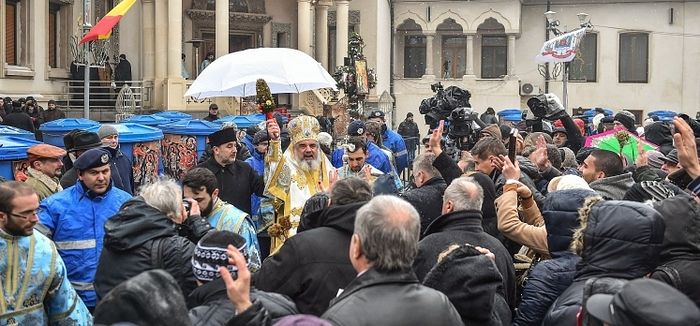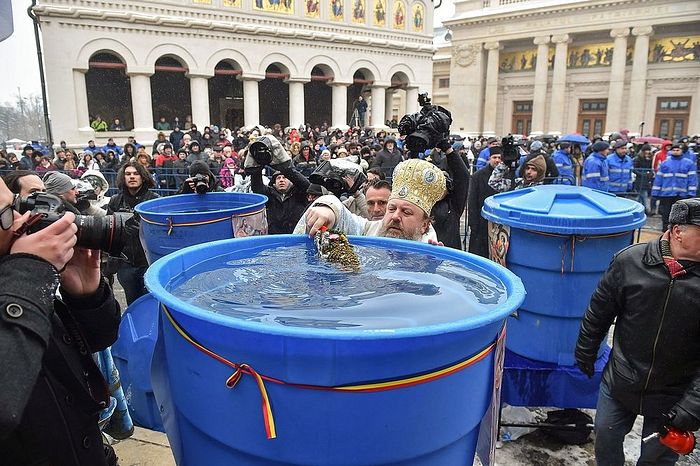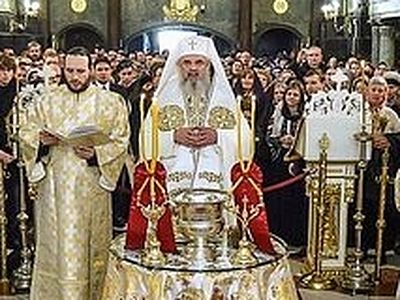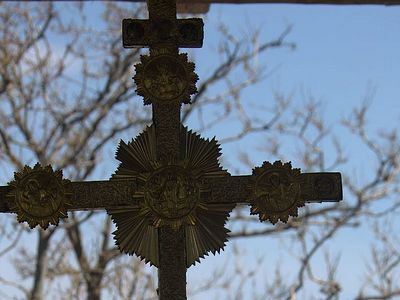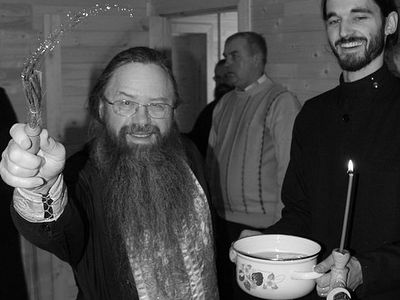Source: Basilica News Agency
January 6, 2016
On January 6 the Orthodox Church celebrates the Baptism of the Lord. The feast recalls the Baptism of Jesus Christ, our Lord, in the River Jordan and His recognition as Messiah by Saint John the Baptist. The feast is also called Epiphany or Theophany, namely the Appearance of the Lord.
The Divine Liturgy was celebrated at the Patriarchal Cathedral by His Beatitude Daniel, Patriarch of Romania, together with His Grace Timotei Prahoveanul, Assistant Bishop to the Archdiocese of Bucharest, assisted by a group of priests and deacons.
On this holy day the text of Matthew 3:13-17 was read: Then Jesus came from Galilee to the Jordan to be baptized by John.But John tried to deter Him, saying, “I need to be baptized by You, and do You come to me?”Jesus replied, “Let it be so now; it is proper for us to do this to fulfil all righteousness”. Then John consented.As soon as Jesus was baptized, He went up out of the water. At that moment heaven was opened, and He saw the Spirit of God descending like a dove and alighting on Him.And a voice from heaven said, “This is My Son, whom I love; with Him I am well pleased.
After reading the Gospel text, His Beatitude delivered a sermon in which he explained the teaching of the text read during the Divine Liturgy.
Baptism is the basic Holy Sacrament of Christian life
This feast reminds us that baptism is a saving and blessing work consisting in the re-establishment of man's relationship with God through the God-Man, through faith in Jesus Christ, through faith in the Holy Trinity which He revealed to us also through baptism. This is why baptism is the basic holy sacrament of Christian life just as it is the foundation of the saving work of Jesus Christ, our Lord. Namely, this re-establishment of man's relationship with God through the God-Man Jesus Christ, Who is baptised in the waters of the Jordan River, is also shown through the fact that the Holy Gospels show that Heaven opened when Jesus Christ, our Savior was baptised. According to the Holy Fathers of the Church, the opening of Heaven means communion of God with man and of man with God, the relationship of eternal love of God with man and of man with God,
the Patriarch of Romania said.
Great Blessing of Waters
After the prayer behind the ambo, the celebrating clergy left the Patriarchal Cathedral and the primate of the Romanian Orthodox Church, His Beatitude Daniel, celebrated the Great Blessing of Waters in front of the patriarchal residence.
After singing the troparia of the Baptism of the Lord: The voice of the Lord cries over the waters ... Today the nature of water is blessed ... As a man you came to the river ... To the voice of the one crying in the wilderness ... three Old Testament readings were read, all from the prophecy of Isaiah (35:1-10; 55:1-13 and 12:3-6). Afterwards, the reading of Saint Paul the Apostle’s first epistle to the Corinthians 10:1-4 was read, and then the text from the Holy Gospel according to Mark 1:9-11 which briefly presents the baptism of the Lord. There followed the Great Litany which included three special petitions for blessing the water, while the prayer: "Jesus Christ, our Lord, Only Begotten Son," was said in low voice. Then, the prayer of Saint Sophrony of Jerusalem to the Holy Trinity was read: "Trinity, higher than nature," and the words: "Great are You, O Lord, and miraculous are Your works," were said three. When the words invoking the Holy Spirit for blessing the water: “Therefore, O King, lover of mankind, be present now too through the descent of Your Holy Spirit, and bless this water” were said three times in a row, the water was blessed three times, every time the priest dipping his hand in the form of the cross in each of the vessels. When the words: “O Master, You Yourself bless this water with Your Holy Spirit” were also said three times in a row, the water was blessed each time in the form of the cross.
There followed the prayer "Bow down, O Lord, Your ear, and listen to us," said in low voice. Then the Holy Cross was dipped in the water at the same time with a bunch of basil making the sign of the cross three times. Afterwards, the Patriarch of Romania sprinkled all those present on the Hill of Joy with holy water, while the troparion "When Thou, O Lord, was baptised in the Jordan" was sung.
At the end of the service His Beatitude Daniel, Patriarch of the Romanian Orthodox Church, delivered a sermon for the faithful present at the Patriarchate in which he spoke about the blessing power of holy water:
The blessing of the waters reminds us that the entire creation is made for deification and blessing. This is why we, those baptised in the name of the Most Holy Trinity, must behave in the world in such a way as to bless and deify the place we are living in and taking good care of God’s creation: not to make it ugly, to desecrate it, to destroy it, not to destroy the beauty of the earth, of the rivers, not to pollute the waters of the seas and oceans. But our many sins which are pollution of the soul cause the pollution of creation quite often because there is a relationship between the sinful soul and the nature desecrated by humans greedy for wealth and not acting responsible for the gifts received from God which one must cultivate and pass on to future generations. This is why the blessing of houses, of gardens and of the world we are living in and which God created calls to great responsibility. Let us bless the gifts received from God and thank Him!
the Patriarch of Romania preached. The faithful present took blessed water from 24 barrels with a total of 12,000 litres. An ice cross was also raised in the Cathedral’s courtyard, adorned with fir branches, flowers and basil.
* * *
The word agiasmos means blessed water in the Greek language. The Great Blessing of Water service is celebrated at Epiphany in remembrance of the Lord being baptised in the Jordan River by John the Baptist. Holy water is taken in the morning, before eating, before antidoron, and when the faithful receive Holy Communion, after it. It can be taken home from the Eve of Epiphany until the Leavetaking of the feast.
Origin and celebration through time
First, the blessing of water at Epiphany was related to the baptism of the catechumens celebrated on the eve of the feast, in the evening (until late in the night) for which the water needed in baptism was blessed. Later on, when the catechumenate was dissolved and baptism of children was generalied, the blessing of the water was preserved, being related to the feast, but with a different significance. As Archbishop Simeon of Thessaloniki points out, on Epiphany day not only is renewal in the baptism of the Lord accomplished, but also the grace of the baptism we all received. The origin of the service of the Great Blessing of Waters is found in Jerusalem, where the very vivid remembrance of the baptism of the Savior by the Forerunner, in the waters of the Jordan River was preserved; hence it spread to Antioch, then to Constantinople and to Asia Minor. This is why the present service of the Great Blessing of Water is ascribed, according to tradition, entirely to Saint Sophrony, patriarch of Jerusalem (+638), to whom the January Menaion ascribes the troparia sung at the beginning of the celebration, while the Euchologion ascribes him a prayer for the blessing of water.
